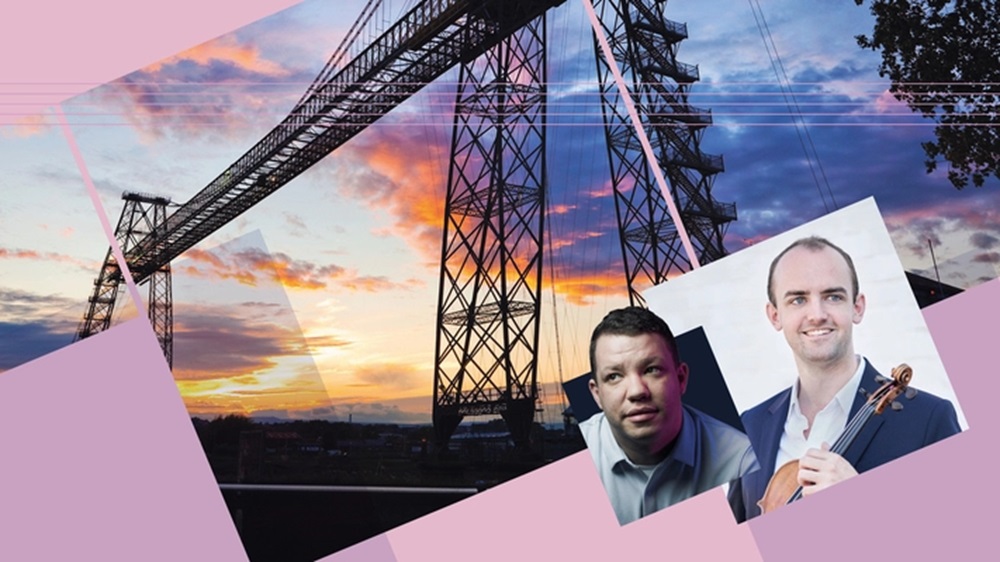Review. BBC National Orchestra of Wales: American Explorations

Saturday 4 May 2024, Hoddinott Hall, Cardiff
Sarah Hill
Samuel Barber’s Adagio for Strings has gained a reputation as a bit of a tear-jerker.
Originally the second movement from Barber’s 1936 string quartet, it is most commonly known in its orchestrated version, whether as accompaniment to moments of national mourning (the funeral of President Franklin Delano Roosevelt, the assassination of President John F. Kennedy; the September 11 attacks, the Charlie Hebdo attacks, the Brussels bombing, the Manchester Arena bombing) or of cinematic tragedy (The Elephant Man, Platoon).
Sometimes familiarity breeds contempt, and Barber himself grew tired of the Adagio’s ubiquity; but there is no denying the emotional impact of the piece. As the opening salvo of the BBC National Orchestra of Wales’s American Explorations concert, it was a reminder of the power of simplicity. BBC NOW conductor Ryan Bancroft painted the sound beautifully, reflecting each gorgeous swell and murmur from the strings with a delicate grace.
Perfect balance
Barber’s Violin Concerto (1939) served as the perfect balance to the Adagio for Strings. New Zealand violinist Benjamin Baker offered a superb interpretation of the work, making even the most technically challenging passages seem effortless.
The second movement of the concerto was a revelation: from the exquisite opening oboe solo through to the closing bars, the violin and orchestra conveyed the full force of Barber’s talent for melody and colour.
Following a heart-racing final movement, Benjamin Baker offered as an encore Coleridge-Taylor Perkinson’s Louisiana Blues Strut: A Cakewalk (2002), a perfect end to the first half of the concert.
Hoddinott Hall was the ideal venue for this programme: at once an ideally intimate space for the Barber yet a room cramped enough to feel oneself bang in the middle of the chaos for the Ives.
And right in the middle of the chaos is the best place from which to experience Ives’s Symphony No 2.
Unapologetic love
I will admit to harboring an unapologetic love of Charles Ives’s second symphony, sparked by my experience playing the piece many years ago as principal oboist with the Oakland Symphony Youth Orchestra.
In my last year of high school we performed the work not only around the San Francisco Bay Area but at an international youth orchestra festival in Aberdeen. For some reason we were chosen as the festival’s resident ensemble, so for the opening night’s concert we played the national anthems of every country represented at the festival, followed by Ives’s Second.
Of all the pieces to have opened a youth orchestra festival, we chose the most anti-canonic, gloriously loud, perversely American mélange imaginable. And if memory serves, the crowd loved it.
Lord knows our own trombone section did, too. And in the many years since that wonderful Year of Ives,
I have caught myself mindlessly fingering the oboe part, as muscle memory triggers my mind’s sonic replay. So it is a piece for which I have a deep and abiding attachment.
Boston
The one other time that I was able to see a live performance of Ives’s Second was some years later, when I lived in Boston. I don’t recall much about the performance itself, but I do recall waiting to file out of Symphony Hall afterward and hearing a nearby group of people loudly mocking the work.
Whatever high I had felt at encountering the piece from the audience was swiftly quashed by a gaggle of high-culture snobs. It was therefore with no little trepidation that I waited for the downbeat of the Ives. And I needn’t have worried: if you will allow a bit of technical musicological jargon, the BBC NOW played the absolute everloving shit out of it.
Ryan Bancroft managed to tease out some moments of pure lyrical beauty throughout the symphony, particularly during the flute, cello, and horn solos.
There were some things I wished had come through more clearly (more Reveille from the trumpet! more snare drum!) but the payoff, after an adrenaline-powered blitz through the last stretch of the fifth movement, was not only the look of elation on the musicians’ faces, but the whoop from the audience that greeted the final chord.
But don’t take my word for it: the whole evening was recorded so you can hear it for yourself on BBC Radio 3, Tuesday 7th May at 19.30.
Sarah Hill is Professor of Popular Music at the University of Oxford.
Support our Nation today
For the price of a cup of coffee a month you can help us create an independent, not-for-profit, national news service for the people of Wales, by the people of Wales.






It was a fantastic concert, and the soloist even stayed to listen to the second half and was talking to members of the audience (including myself!). It’s brilliant to have such access to world class arts here in Cardiff, also with very good pricing and access initiatives for disabled, students etc.